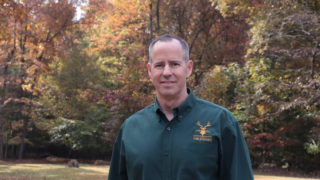Dr. Steven Eschenaur is an ambassador of the 2022 Heart Healthy Hunting Campaign in West Virginia and shares his thoughts on the campaign and what it can mean for the s tate.
tate.
Like many West Virginians, I, too, am an avid hunter. I share this information about myself
because I understand the lure of the mountains this time of year. When the leaves put on their
fall colors, my mind turns to the woods. I want to be nowhere else, and I know my fellow
sportsmen and women feel the same.
As a longtime emergency physician, I’ve seen a tragic side of hunting, too. It forces me to have painful conversations with families who have just lost loved ones because they had a heart attack or stroke while hunting and couldn’t get help quickly enough. This little-known consequence of a tradition so many of us love is something we don’t like to think or talk about, but we should.
Accidental deaths caused by weapon misfires and tree stand accidents grab our attention, but in reality, they are the exception. Most of the time, an unknown, or worse – an
ignored-but-pre-existing health condition – strikes while hunters are in the forest. If you are alone when this happens, the situation can go bad quickly. I want my fellow hunters to take some simple steps to ensure they have the best chance of survival should something happen:
1. Take it seriously: Do not dismiss this as if it cannot happen to you. Heart attack and stroke can strike any of us at any age and any fitness level. Seemingly healthy people end up in emergency rooms surprised that they are having a heart attack or stroke.
2. Be prepared. Get a checkup from your doctor before heading into the forest this hunting season. Convenient or not, this is crucial. Have an honest conversation with your doctor about any symptoms you might be having, your family history, lifestyle choices and fitness level. So many West Virginians do not visit a doctor unless they are very sick. We need to turn that thinking around. See your doctor before you have a serious medical issue.
3. Make a plan. Know when and where you are going to hunt. Tell your family and friends your plan and when you will return. Know where the closest hospital is and the most direct route to it from your hunting location. Make sure your phone is charged and make note of your emergency contacts, medications and allergies in an obvious place.
4. Know the signs and symptoms of a heart attack. Heart attack symptoms include chest discomfort in the center of the chest that lasts more than a few minutes or that
goes away and comes back. It can feel like pressure, tightness, squeezing, or pain. You might also feel dull pain in one or both arms, back, neck, jaw or stomach. You could
experience shortness of breath with or without chest discomfort. You also could break out into a cold sweat, feel nauseated or weak, and/or become lightheaded.
5. Think F.A.S.T. if you believe you are having a stroke. FACE Drooping – Does one side of your face droop or is it numb? Can you smile? ARM Weakness – Is one arm
weak or numb? Can you raise both arms? Does one arm drift downward? SPEECH Difficulty – Is speech slurred, are you unable to speak or become hard to understand?
TIME To Call 911 – If you or anyone you’re with shows any of these symptoms – even if they go away – call 911 and get to the hospital immediately.
This month is the American Heart Association’s “Heart Healthy Hunting Month.” I feel privileged to have worked with the organization’s West Virginia team to remind hunting enthusiasts they need to take their health seriously, know the signs and be prepared. When everything goes to plan on a hunting trip, it is absolute perfection. When things go wrong, remember that time is not on your side deep in our rugged mountains. Time is muscle during a heart attack, and time is brain tissue during a stroke. I’ll say it again, take your health seriously.
— Dr. Steven Eshenaur, D.O., M.B.A., is the health officer and director of the
Kanawha-Charleston Health Department.